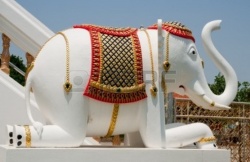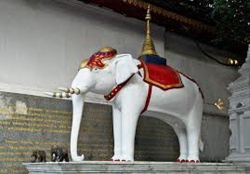Airavata
A white elephant is an idiom for a valuable but burdensome possession of which its owner cannot dispose and whose cost (particularly cost of upkeep) is out of proportion to its usefulness or worth. The term derives from the story that the kings of Siam (now Thailand) were accustomed to make a present of one of these animals to courtiers who had rendered themselves obnoxious, in order to ruin the recipient by the cost of its maintenance. In modern usage, it is an object, scheme, business venture, facility, etc., considered without use or value.
Albino elephants exist in nature, usually being a reddish-brown or pink color
The term derives from the sacred white elephants kept by Southeast Asian monarchs in Burma, Thailand, Laos and Cambodia. To possess a white elephant was regarded (and is still regarded in Thailand and Burma) as a sign that the monarch reigned with justice and power, and that the kingdom was blessed with peace and prosperity. The opulence expected of anyone that owned a beast of such stature was great. One must imagine golden palaces built to house the beast, attendant staff not limited to cooks, artisans, musicians …temples, keeping in mind the holy aspect of the white elephant, it would be akin to housing and caring for an entire church or congregation and having to devote every resource to its needs. Monarchs often exemplified their possession of white elephants in their formal titles (e.g., Hsinbyushin, lit. "Lord of the White Elephant" and the third monarch of the Konbaung dynasty).
White elephants are linked to Hindu cosmology, the mount of Indra, king of the Vedic deities is Airavata, a white elephant. White elephants are also intricately linked to Buddhist cosmology, the mount of Sakka's (a Buddhist deity and ruler of the Tavatimsa heaven) is a three-headed white elephant named Airavata.
The tradition derives from tales that associate a white elephant with the birth of the Buddha, as his mother was reputed to have dreamed of a white elephant presenting her with a lotus flower, a common symbol of wisdom and purity, on the eve of giving birth. Because the animals were considered sacred and laws protected them from labor, receiving a gift of a white elephant from a monarch was simultaneously a blessing and a curse. It was a blessing because the animal was sacred and a sign of the monarch's favour, and a curse because the recipient now had an expensive-to-maintain animal he could not give away and could not put to much practical use.
The Order of the White Elephant consists of eight grades of medals issued by the government of Thailand. There are also white elephants in Nepal.
In the nineteenth century the phrase became commonplace, in common use at church bazaars called “white elephant sales” where donors could unload unwanted bric-a-brac, generating profit from the phenomenon that one man’s trash is another man’s treasure. Many organizational and church fairs still use the term today. In general use a “white elephant” usually refers to an item that’s not useful (decorative) but may be expensive and odd.
In Buddhism, white elephants are a symbol of the power to produce rain. The white elephants are considered very special animals. In most Asian communities, they were a symbol of power and were associated with the royal family. The colour white denotes purity, holiness and cleanliness in Buddhism. It is also referred to as "the one who leads out beyond the darkness of bondage" Different cultures have different meanings for the elephant, but for the most part, the elephant will usually symbolize strength, good fortune and good luck. The symbol of elephant represents endurance and a character that is strong and unshakable. According to Buddhist texts, Sakyamuni Buddha’s mother, Queen Maya dreamt that a white elephant with six tusks entered her side – a sign of divine conception. Thus, a white elephant has long been synonymous with the Buddha himself.

